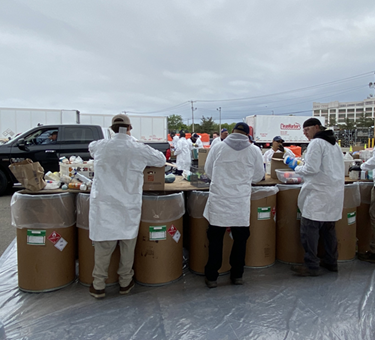

Clean Harbors Helps Keep Communities Clean and Safe
Clean Harbors is honored to partner with municipalities across the country in holding Household Hazardous Waste (HHW) collection events. We understand the importance of keeping our communities safe and our environments clean, which is why we take great pride in being a trusted leader in environmental services. From coast to coast, communities rely on us to handle their paints, solvents, batteries, fluorescent lamps, pesticides, cleaners, and other hazardous materials with the utmost care.
Whether it's a one-day event, a multi-day program, or a mobile collection, you can count on us to manage the process safely, efficiently, and with the highest regard for the environment. We’re here to help make the disposal of hazardous waste as convenient and worry-free as possible, because we believe in supporting our neighbors. Together, we can ensure a healthier, cleaner future for everyone.
Dangers of Household Hazardous Waste
The U.S. Environmental Protection Agency recommends avoiding potential risks associated with Household Hazardous Wastes, and suggests people always monitor the use, storage and disposal of products with potentially hazardous substances in their homes. Improper disposal of HHW can include pouring them down the drain, on the ground, into storm sewers or, in some cases, putting them out with the regular trash. The dangers of such disposal methods might not be immediately obvious, but improper disposal of these wastes can pollute the environment and pose a threat to human health. Certain types of HHW have the potential to cause physical injury to sanitation workers or contaminate septic tanks and wastewater treatment systems if poured down drains or toilets. They can also present hazards to children and pets if left around the house.
For more safe handling tips and recommendations, visit the EPA's website here.
Top 10 Reasons to Participate in Your Community’s Household Hazardous Waste Days
- Safe Disposal: We provide a safe and convenient way for residents to dispose of household hazardous materials such as chemicals, paints, batteries and electronics that cannot be thrown away with regular trash.
- Prevention of Environmental Contamination: Proper disposal prevents these household hazardous materials from contaminating soil, water and air, thereby safeguarding local ecosystems and public health.
- Reduced Risk of Accidents: Keeping household hazardous materials out of regular trash reduces the risk of accidents and injuries to sanitation workers and the public.
- Promotion of Recycling and Reuse: Many items collected at household hazardous waste days, such as electronics and certain chemicals, can be recycled or reused, contributing to resource conservation and waste-reduction efforts.
- Community Education: These events often include educational programs and resources to raise awareness about the importance of proper household hazardous waste disposal and encourage environmentally responsible behavior.
- Compliance with Regulations: By providing designated collection days, municipalities ensure compliance with local, state and federal regulations regarding the disposal of household hazardous waste.
- Cost Savings: Proper disposal of household hazardous waste through designated collection events can help municipalities avoid costly clean-up efforts resulting from improper disposal or environmental contamination.
- Community Engagement: Household hazardous waste days provide opportunities for community members to come together and participate in efforts to protect the environment and public health, fostering a sense of civic responsibility and community pride.
- Health Protection: By preventing household hazardous materials from leaching into the environment, these events help protect the health of residents and wildlife that may be exposed to toxic substances.
Long-term Environmental Benefits: Proper disposal of household hazardous waste contributes to the long-term health and sustainability of ecosystems, ensuring that future generations can enjoy clean air, water and soil.

Acceptable Items
- Used and unused motor oils
- Drain cleaners
- Metal polish
- Photo chemicals
- Dry cleaning fluids
- Rust preventatives
- Wood strippers
- Paint thinner
- Sealants
- Engine and radiator flushes
- Old chemistry sets
- Herbicides
- Brake fluid
- Pool chemicals
- Creosote
- Moth balls
- Ammonia
- Household batteries
- Oven cleaners
- Arts and crafts supplies
- Floor cleaners
- Radiator cleaners
- Wood preservatives
- Oil based paint
- Solvents
- Antifreeze
- Transmission fluid
- Pesticides
- Insect sprays
- Rodent killers
- Muriatic acid
- Batteries
- Bleaches
- Cesspool cleaners
All unacceptable wastes will be visually identified prior to being removed from the participant's vehicle and will be left in the vehicle with an explanation to the participant. Such wastes include:
- Large quantities of unknown materials
- Radioactive waste, including smoke detectors
- Explosives, gun powder, flares, ammunition
- Unstable wastes
- Unknown gas cylinders
- Substances regulated by the Drug Enforcement Agency
- Biohazardous waste, infectious waste, needles/syringes

Learn More
Clean Harbors recognizes that sustainability stewardship is core to our business and an important part of our responsibility in protecting generations to come through balancing economic success with environmental, social and governance considerations.
Sustainability is not only about doing less to harm the earth or consuming less resources, but also about doing more good and minimizing the cumulative impact of other companies and industry. Our sustainability programs expand our commitment beyond our services and products to include our operations, employees and community. Learn more here
